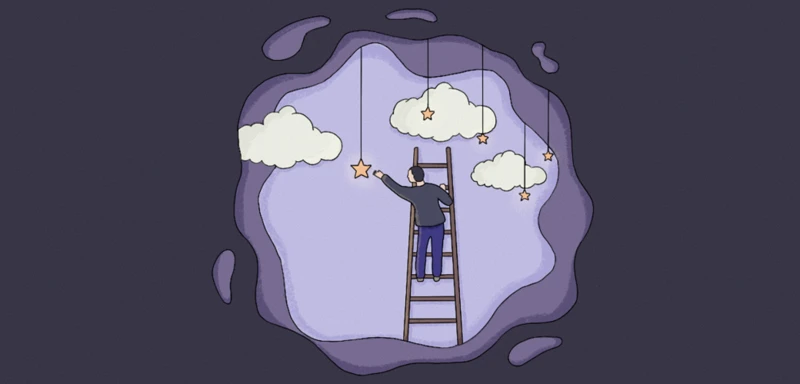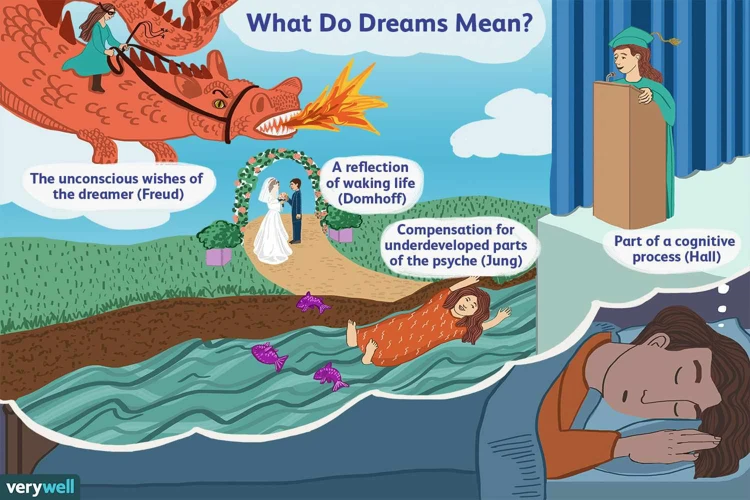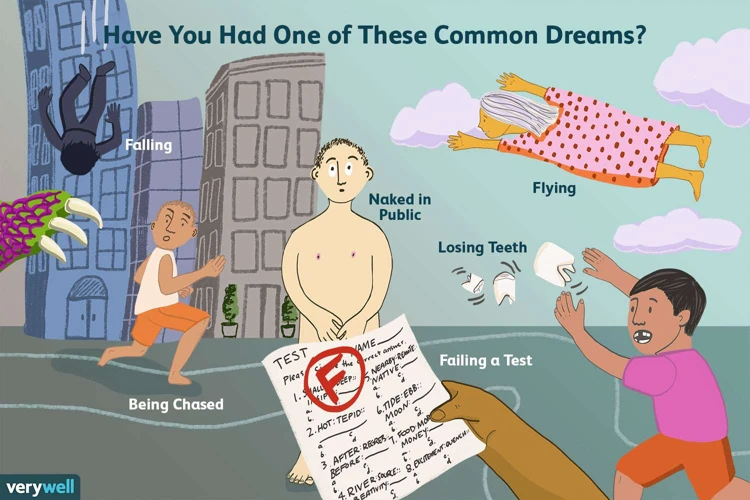Have you ever woken up in a cold sweat, heart racing, after experiencing a terrifying nightmare? Nightmares are surreal and often distressing, leaving us feeling confused and disoriented upon waking. As we try to make sense of these nocturnal terrors, one recurring symbol that frequently appears is the sensation of falling. In this article, we will delve into the symbolism of falling in nightmares and explore the various psychological interpretations behind this phenomenon. From a fear of losing control to feelings of helplessness and the inability to trust, we will unravel the deep-rooted fears and anxieties that falling represents in our subconscious minds. Additionally, we will examine the cultural and historical significance of this symbol, as well as its connection to lucid dreaming. Lastly, we will discuss therapeutic techniques to overcome nightmares and restore balance to our dreamscapes. So, fasten your seatbelts and join us on this journey through the enigmatic realm of falling in nightmares.
Understanding Nightmares

Nightmares are vivid and unsettling dreams that can leave us feeling shaken and disturbed. They often occur during rapid eye movement (REM) sleep, which is the stage of sleep most closely associated with dreaming. While the exact cause of nightmares is still uncertain, researchers believe that they may be triggered by a variety of factors, including stress, trauma, anxiety, and certain medications. Nightmares can manifest in different ways, with themes ranging from being chased or attacked, to feeling lost or being late. These dreams can feel incredibly real, evoking intense emotions and physical sensations. They can be particularly distressing when recurring, leaving individuals feeling exhausted and anxious. Understanding nightmares is essential to gaining insight into our subconscious minds and unraveling the hidden meanings behind the symbols that appear within our dreams. By exploring the symbolism of falling in nightmares, we can begin to decode the messages that our unconscious selves are trying to convey. So, let us dive deeper into the enigmatic world of dreams and discover the fascinating realm of understanding nightmares.
The Symbolism of Falling

The symbolism of falling in nightmares can be multi-faceted, representing various deep-rooted fears and anxieties that reside within our subconscious minds. One possible interpretation of falling is the fear of losing control. When we experience the sensation of falling, we feel a lack of stability and a sense of helplessness as we plummet into the unknown. This symbolizes our fear of relinquishing control over our lives and the uncertainties that lie ahead. Another aspect of falling in nightmares is the sense of helplessness it embodies. It reflects our vulnerability and powerlessness in the face of challenging situations. Additionally, falling can signify an inability to trust, as we struggle to place faith in ourselves or others, fearing that they may let us down. Falling in nightmares may also represent a fear of failure, symbolizing our anxieties about not living up to expectations or not meeting our goals. The myriad interpretations of falling in nightmares highlight the complexity of our subconscious fears and remind us of the significance that dreams hold in uncovering our deepest insecurities. To understand the symbolism of falling further, it is crucial to explore the specific context and personal experiences that surround the dreamer. (source: interpretation of lost symbolism in nightmares)
Fear of Losing Control
The symbolism of falling in nightmares can often be associated with a deep-seated fear of losing control. When we experience a dream where we are suddenly plummeting from great heights, it reflects a sense of powerlessness and the inability to influence the events unfolding around us. This fear of losing control may originate from real-life situations where we feel overwhelmed or unable to handle the circumstances. In the dream realm, this fear is magnified as we are stripped of any control over our descent. The sensation of falling acts as a metaphor for the lack of control we experience in our waking lives. It symbolizes a perceived loss of power and a fear of the unknown. This theme is common in nightmares, as it taps into our deepest fears and vulnerabilities. Our subconscious mind uses the profound imagery of falling to highlight our underlying anxieties and remind us of the importance of regaining control over our lives. By exploring this symbolism, we can seek to understand the sources of our fear and take steps towards reclaiming our personal agency. To delve further into the meanings of other commonly experienced nightmare symbols such as being chased or feeling lost, you can read our insightful article on the interpretation of the symbolism of being lost in a nightmare.
Sense of Helplessness
The sensation of falling in nightmares often evokes a profound sense of helplessness. When we plummet through the void in our dreams, we experience a complete loss of control over our surroundings and our own bodies. This imagery taps into our primal fear of powerlessness, echoing the vulnerability we may feel in waking life. In these nightmares, we are stripped of our ability to influence or change the course of events, leaving us at the mercy of gravity’s pull. This feeling of helplessness can stem from various sources, such as unresolved conflicts, feelings of insignificance, or a lack of agency in our daily lives. It may also reflect a deep-rooted fear of being unable to protect ourselves or others in times of danger. The sense of helplessness can be exacerbated if the falling sensation is accompanied by other distressing elements in the dream, such as being chased or seeing imminent danger. These nightmares serve as reminders of our vulnerability as human beings and provide an opportunity for introspection and personal growth. By exploring the symbolism of helplessness within the context of falling nightmares, we can begin to understand and address the underlying fears and anxieties that may be contributing to these unsettling dreams. To learn more about the meaning behind being chased in nightmares, check out our article on the symbolism of being chased in nightmares.
Inability to Trust
When falling in nightmares, one symbolism that often arises is an underlying fear of the inability to trust. It may stem from past experiences in which trust was betrayed or shattered, leaving deep emotional scars. The sensation of falling can represent a metaphorical fall from grace, where the individual feels a lack of trust in themselves or others. This lack of trust can manifest in different forms, such as difficulty forming and maintaining close relationships, skepticism towards others’ intentions, or a constant fear of being let down. The dreamer may subconsciously associate falling with a loss of control and vulnerability, making it challenging to trust others or even trust themselves. This fear of betrayal and mistrust can seep into their waking life, causing them to approach relationships and interactions with caution and skepticism.
The symbolism of falling in nightmares can be a sign that the dreamer needs to confront and address their underlying trust issues. It may indicate a need for healing and the rebuilding of trust, both within themselves and in their relationships with others. By recognizing the symbolism and delving into the root causes of these trust issues, the dreamer can begin the journey towards a healthier and more fulfilling life. Seeking therapy or counseling can provide valuable guidance and support in addressing trust-related concerns and working through past traumas.
Understanding the significance of the inability to trust in falling nightmares is crucial in unraveling the deeper psychological and emotional aspects of the dream experience. By acknowledging and addressing these trust issues head-on, individuals can take steps towards developing stronger and more meaningful connections, both within themselves and in their relationships with others.
If you’d like to explore the potential meanings of being late in nightmares, you can check out our article on the potential meanings of being late in nightmares.
Fear of Failure
The symbolism of falling in nightmares often represents a deep-seated fear of failure. Falling signifies a loss of control and a descent into the unknown, mirroring the fear of not being able to achieve our goals or meet expectations. Those who experience this fear of failure in their waking lives may find themselves confronted by it in their nightmares. The feeling of helplessness and vulnerability that accompanies falling reflects the anxiety and self-doubt associated with the fear of not living up to one’s own or others’ standards. It is in these nightmares that individuals may confront their deepest insecurities and confront the possibility of failure head-on. The mind uses this symbolic language of falling to express the fear and anxiety of falling short, exploring the emotional impact of failure in a safe and controlled environment. By recognizing and acknowledging this fear within nightmares, individuals can gain insights into their subconscious fears and work towards overcoming them in their waking lives.
Psychological Interpretations

Psychological interpretations of nightmares provide valuable insights into the underlying meanings of these unsettling dreams. From a psychoanalytic perspective, nightmares are seen as expressions of repressed desires or unresolved conflicts. The symbolism of falling in nightmares can indicate a fear of losing control, representing unconscious anxieties about one’s ability to manage life’s challenges. The sensation of helplessness during a fall in a dream may reflect deep-seated feelings of powerlessness or vulnerability in waking life. The inability to trust, whether it be oneself or others, can be symbolized by the fear of falling in a nightmare. These psychological interpretations shed light on the complex emotions and fears that can manifest in our dreams. By exploring these interpretations, we can gain a better understanding of ourselves and potentially uncover unresolved issues that require attention and healing.
Psychoanalytic Perspective
The psychoanalytic perspective provides valuable insights into the symbolism of falling in nightmares. According to Sigmund Freud, dreams are the “royal road to the unconscious”, offering a glimpse into our deepest desires, fears, and unresolved conflicts. From a psychoanalytic standpoint, falling in nightmares represents a sense of inadequacy and castration anxiety. Freud believed that falling dreams are associated with repressed sexual desires and feelings of powerlessness. The act of falling symbolizes the fear of losing control, both in a physical and metaphorical sense. It reflects a fear of failure and a deep-seated anxiety regarding one’s own competency and ability to navigate life’s challenges successfully. Falling in nightmares can also be interpreted as a manifestation of unresolved childhood issues, particularly related to separation anxiety and the fear of abandonment. By analyzing the psychoanalytic perspective, we gain a greater understanding of how the symbolism of falling in nightmares is intricately linked to our deepest fears, insecurities, and unresolved psychological conflicts. It is through the exploration of these underlying dynamics that we can begin to unravel the intricate web of symbols that populate our dreamscapes.
Archetypal Analysis
Archetypal analysis offers an intriguing perspective on the symbolism of falling in nightmares. According to Carl Jung, a renowned psychologist, archetypes are universal symbols or patterns that are deeply rooted in the collective unconscious of human beings. These archetypes represent fundamental aspects of the human experience and can be found across cultures and civilizations. When it comes to falling in nightmares, the archetype of the Abyss or the Void often comes into play. The Abyss represents the unknown, chaos, and the fear of losing oneself. Falling into the Abyss can symbolize a descent into the depths of the unconscious, confronting our deepest fears and insecurities. It can also represent a willingness to confront the unknown and embark on a journey of self-discovery. Additionally, the archetype of the Fallen Hero may be present in dreams of falling. This archetype represents the fear of failure and the loss of one’s status or power. Falling in dreams can serve as a reminder of our vulnerabilities and shortcomings, challenging us to confront our fears of inadequacy and learn from our mistakes. By undertaking an archetypal analysis of falling in nightmares, we can gain a deeper understanding of ourselves and the universal themes that permeate our dreamscape.
Trauma and Anxiety
Trauma and anxiety play significant roles in the manifestation of nightmares, including the symbolism of falling. Traumatic experiences, such as accidents, abuse, or witnessing a distressing event, can leave lasting imprints on our psyche. These experiences can manifest in dreams as a way for our minds to process and make sense of the trauma. Falling, in the context of nightmares, can represent a loss of control and a sense of powerlessness that often accompanies traumatic events. The feeling of helplessness and vulnerability that comes with falling reflects the deep-seated fears and anxieties that trauma can instill within us. Additionally, anxiety can contribute to the recurrence of nightmares and the symbolism of falling. High levels of stress and anxiety can create a constant state of unease, making us more susceptible to experiencing intense and unsettling dreams. The fear of failure, the fear of the unknown, and a general sense of insecurity can all be factors that contribute to the symbolism of falling in anxiety-driven nightmares. It is important to address and seek support for trauma and anxiety to mitigate the impact they have on our dream experiences and overall well-being.
Cultural and Historical Context

The symbolism of falling in nightmares can also be understood within a cultural and historical context. Different cultures and societies have attributed various meanings to this common dream theme throughout history. In ancient Greek mythology, the god Hypnos, who was responsible for sleep and dreams, often caused individuals to experience falling dreams as a means of conveying messages or warnings. In Chinese culture, falling in dreams is often seen as a sign of bad luck or impending misfortune. The cultural context in which we grew up can shape our interpretation of falling in nightmares as well. For example, in Western cultures, falling is often associated with a loss of control or a fear of failure. This cultural lens influences how we perceive and understand the symbolism of falling in our dreams. Historical events and societal influences can also impact the interpretation of falling in nightmares. For instance, during times of war or economic instability, falling dreams may represent a sense of insecurity or vulnerability. By examining the cultural and historical context surrounding falling in nightmares, we can gain a deeper understanding of the symbolic significance these dreams hold across different societies and time periods.
Lucid Dreaming and Falling

Lucid dreaming is a phenomenon where the dreamer becomes aware that they are dreaming while still in the dream state. This awareness allows individuals to have some level of control over their dreams, making it possible to manipulate the dream environment and even the dream narrative. When it comes to exploring the symbolism of falling in nightmares, lucid dreaming can offer a unique perspective and opportunity for self-exploration.
During a lucid dream, when the dreamer becomes aware of the falling sensation, they have the ability to transform this potentially terrifying experience into a more empowering one. Instead of succumbing to fear and helplessness, lucid dreamers can embrace the falling symbolism and use it as a catalyst for personal growth and exploration. They can choose to confront their fears head-on, trusting their ability to navigate and overcome the challenges presented in their dreams.
One technique that can be employed during a lucid dream involving falling is to change the course of the descent. By mentally shifting the direction of the fall or even slowing down the speed, the dreamer can regain a sense of control and transform the experience into a thrilling adventure rather than a nightmare. Additionally, practicing mindfulness during the lucid dream can help individuals maintain a sense of calm and detachment, allowing them to observe the falling symbol without becoming overwhelmed by fear or anxiety.
It is important to note that lucid dreaming is a skill that can be developed with practice and patience. Techniques such as reality checks, dream journaling, and visualizations can aid in increasing lucidity during dreams. By incorporating these practices into a regular routine, individuals can enhance their dream recall and promote lucid dreaming, providing them with the opportunity to explore and interpret the symbolism of falling within the safe space of their dreams.
Lucid dreaming offers a fascinating avenue for exploring the symbolism of falling in nightmares. It allows dreamers to actively engage with their dreams, transforming the falling sensation into a source of empowerment and personal growth. By honing the skills of lucid dreaming, individuals can confront their fears, gain insight into their subconscious mind, and ultimately find resolution and peace within their dreamscapes. So, grab hold of the dream world and embrace the thrill of falling with open arms, as you dive into the depths of your unconscious mind.
Overcoming Nightmares
Nightmares can have a profound impact on our well-being, causing distress and disrupting our sleep patterns. However, there are strategies and therapeutic techniques that can help individuals overcome these unsettling dreams and restore a sense of calm. One effective approach is through the use of therapeutic techniques, such as imagery rehearsal therapy, which involves mentally rehearsing a new, positive outcome for the nightmare scenario. Another helpful technique is mindfulness and meditation, which can cultivate a sense of relaxation and reduce anxiety before sleep. Keeping a dream journal can also be beneficial for understanding recurring patterns or symbols in nightmares, allowing individuals to explore their deeper meanings. By actively engaging in these practices, individuals can regain control over their dreams and transform nightmares into more positive experiences, ultimately leading to improved sleep and well-being. So, don’t let nightmares hold you captive in the realm of fear, but instead empower yourself with the tools to overcome them and reclaim the serenity of your dreamscapes.
Therapeutic Techniques
Therapeutic techniques can be beneficial in addressing and managing nightmares. These techniques aim to alleviate the distress caused by recurring nightmares and help individuals regain a sense of control over their dreams. Here are some effective therapeutic techniques for tackling nightmares:
1. Imagery Rehearsal Therapy (IRT)
IRT is a widely used technique that involves rewriting the endings of nightmares to create more positive outcomes. It involves recalling the nightmare and then mentally rehearsing a new, more positive version of the dream. By repeatedly practicing the revised dream scenario, individuals can train their minds to replace the negative imagery with positive imagery, leading to a reduction in the frequency and intensity of nightmares.
2. Cognitive Behavioral Therapy (CBT)
CBT focuses on identifying and challenging negative thoughts and beliefs that contribute to nightmares. It involves working with a therapist to reframe negative thinking patterns and develop more positive and realistic thoughts. By addressing underlying fears and anxieties, CBT can help individuals gain a better understanding of their nightmares and develop coping strategies to manage them effectively.
3. Relaxation Techniques
Practicing relaxation techniques such as deep breathing, progressive muscle relaxation, and guided imagery can help reduce overall stress levels and promote better sleep. These techniques can be useful in calming the mind before sleep, making it easier to fall asleep and decreasing the likelihood of nightmares.
4. Mindfulness and Meditation
Engaging in mindfulness practices and meditation can help individuals become more aware of their thoughts and emotions, including those experienced during nightmares. By cultivating a nonjudgmental and accepting mindset, individuals can develop resilience and learn to observe their nightmares without becoming overwhelmed or reactive.
5. Sleep Hygiene
Maintaining good sleep hygiene practices can contribute to more restful sleep and potentially reduce the occurrence of nightmares. This includes following a consistent sleep schedule, creating a relaxing sleep environment, avoiding stimulating activities before bed, and limiting the consumption of caffeine and nicotine.
6. Consultation with a Mental Health Professional
If nightmares persist and significantly impact daily life, it may be beneficial to seek guidance from a mental health professional. They can provide personalized strategies and support based on an individual’s specific needs and circumstances.
Remember, each individual is unique, and different techniques may work better for some than others. It may be necessary to try a combination of approaches to find what works best in managing and overcoming nightmares. With time, patience, and the right techniques, it is possible to regain control over your dreams and enjoy restful nights of sleep.
Mindfulness and Meditation
Mindfulness and meditation techniques can be powerful tools for overcoming nightmares and promoting overall mental well-being. These practices involve cultivating a state of awareness and presence in the present moment, allowing one to observe their thoughts and emotions without judgment. When it comes to nightmares, mindfulness can help individuals develop a sense of detachment from the intense emotions and fear associated with these dreams. By consciously acknowledging and accepting the experience without getting caught up in its intensity, individuals can reduce the level of distress caused by the nightmare.
One method to incorporate mindfulness into one’s life is through meditation. Meditation involves finding a quiet and comfortable space to sit and focus one’s attention on the breath or a specific object, such as a candle flame or a mantra. Through consistent practice, meditation can promote relaxation, reduce anxiety, and improve overall sleep quality. This, in turn, can help alleviate the frequency and intensity of nightmares.
In addition to regular meditation, there are specific mindfulness techniques that can be applied when experiencing a nightmare. One approach is to practice grounding exercises, such as focusing on physical sensations or using deep breathing techniques. By redirecting attention to the present moment and the body’s sensations, individuals can shift their focus away from the nightmare and regain a sense of control.
Another technique is to cultivate positive affirmations or mantras to repeat to oneself before going to bed or during a nightmare. This can help counteract negative thoughts and emotions, promoting a more positive and empowering dream experience. Additionally, engaging in relaxation exercises, such as progressive muscle relaxation or guided imagery, can help alleviate stress and anxiety that may contribute to nightmares.
By integrating mindfulness and meditation practices into one’s daily routine, individuals can develop a greater awareness of their dream patterns and emotions, creating a foundation for overcoming nightmares. These techniques not only provide a sense of calm and tranquility but also allow individuals to develop a deeper understanding of their own inner experiences. In the journey of exploring the symbolism of falling in nightmares, mindfulness and meditation serve as powerful allies in unraveling the messages and fears hidden within our dreamscape.
Dream Journaling
Dream journaling is a powerful technique that can aid in understanding and interpreting the symbols and themes present in our dreams, including the symbolism of falling in nightmares. Keeping a journal by our bedside allows us to capture the details of our dreams as soon as we wake up, while they are still fresh in our minds. This practice helps to bridge the gap between the dream world and the conscious world, allowing us to reflect on and analyze our dreams at a later time. When journaling, it is crucial to record not only the events of the dream but also the emotions, sensations, and any symbols or recurring themes that stood out. By documenting our dreams, we create a valuable resource for self-reflection and exploration. Over time, patterns may emerge, and we may start to notice common symbols or themes, such as falling, that recur in our nightmares. Journaling also enables us to establish a deeper connection with our dreams and can serve as a tool for personal growth and self-awareness. Additionally, it can be beneficial to read through past entries to identify any changes or progress in our dreaming patterns. By engaging in dream journaling, we create a safe space for our subconscious mind to express itself, allowing us to gain valuable insight into the hidden meanings behind our nightmares and ultimately work towards overcoming them. So, grab a pen and notebook, and let the pages of your dream journal become a gateway into the mysteries of your sleeping mind.
Conclusion
In conclusion, exploring the symbolism of falling in nightmares unveils a world of subconscious fears and anxieties. The sensation of falling represents a fear of losing control, a sense of helplessness, the inability to trust, and the fear of failure. Through psychological interpretations such as the psychoanalytic perspective, archetypal analysis, and the correlation with trauma and anxiety, we can gain a deeper understanding of the underlying meanings behind these dreams. Additionally, considering the cultural and historical context surrounding the symbolism of falling provides further insights into the collective human psyche. The connection between falling and lucid dreaming highlights the potential for self-awareness and control within nightmares. Finally, we explore therapeutic techniques like mindfulness, meditation, and dream journaling, which can help individuals overcome nightmares and regain a sense of peace in their dreamscapes. By unraveling the mysteries of falling in nightmares, we can embark on a journey of self-discovery and cultivate a greater understanding of the complex nature of our dreams. So, next time you find yourself plummeting through the darkness of a dream, remember that there is meaning in the fall, and it serves as an opportunity for personal growth and transformation.
Frequently Asked Questions
Why do we have nightmares?
Nightmares can occur for various reasons, including stress, anxiety, trauma, medications, and sleep disorders. They are believed to be a way for our minds to process and cope with challenging emotions and experiences.
What is the purpose of nightmares?
Nightmares serve as a form of psychological processing, allowing our minds to confront and work through fears, anxieties, and unresolved issues. They can also act as a warning sign or signal that something may be amiss in our waking lives.
Can nightmares be a result of sleep disorders?
Yes, nightmares can be associated with sleep disorders such as sleep apnea, insomnia, or restless leg syndrome. These conditions can disrupt our sleep patterns and lead to more frequent and intense nightmares.
Are nightmares more common in children or adults?
Nightmares are more prevalent in children, particularly during periods of rapid development and increased vulnerability. However, adults can also experience nightmares, especially during times of high stress or emotional turmoil.
Is there a connection between nightmares and traumatic experiences?
Yes, nightmares are often linked to trauma or traumatic experiences. They can be a way for the mind to process and attempt to make sense of disturbing events and emotions.
How can nightmares impact our mental health?
Repeated nightmares can contribute to sleep disturbances and insomnia, leading to fatigue, stress, and overall mental health issues. They can also exacerbate anxiety and contribute to the development of post-traumatic stress disorder (PTSD).
Are there any natural remedies for reducing nightmares?
Some natural remedies that may help reduce nightmares include practicing relaxation techniques, maintaining a regular sleep schedule, engaging in stress-reducing activities, and creating a calming bedtime routine.
What is the difference between a nightmare and a night terror?
A nightmare is a disturbing dream that can often be recalled upon waking, whereas a night terror is a sleep disorder characterized by sudden arousal, intense fear, and a sense of panic, typically with no recollection of the event.
Can lucid dreaming help with overcoming nightmares?
Yes, lucid dreaming, a state where the dreamer becomes aware that they are dreaming, can provide a level of control and empowerment during nightmares. By practicing lucid dreaming techniques, individuals can actively alter the course of their dreams and reduce feelings of fear and helplessness.
When should someone seek professional help for their nightmares?
If nightmares persist and significantly impact daily functioning, it may be beneficial to seek the guidance of a mental health professional. They can provide valuable insights, therapy, and techniques to address and manage recurring nightmares.








